Covid has caused tremendous pain. But it could’ve been so much worse, and it’s frankly dumb luck that things weren’t 100-1,000 times more painful. The (potential) silver lining is that things were juuust bad enough to catalyze meaningful change in the future — such as treating essential workers better and building more local slack in the supply chain — but will we individually and as a society take advantage of this luck, or play dumb and roll the dice again?
Flaws in human nature, such as normalcy bias and the boiling frog metaphor, are a big reason why we’re in these situations to begin with. Those defects in our collective caveman brains create a sort of barrier that prevents our society from solving these next waves of problems, such as dealing with the climate crisis before it’s too late.
Covid is no exception. Experts had been screaming for years that we were unprepared for a serious pandemic that was a matter of when not if.
Hell, there was even a documentary called Pandemic: How to Prevent an Outbreak released on Netflix in January, 2020 that had interviews with scientists saying things like: “I’m terrified of a novel coronavirus crossing over from something like a bat into humans in China. Our system is not ready to handle it, and in fact we’re going in the wrong direction to prepare.”
Well-timed prophecy? Conspiracy?!
No… it’s just logic and data from people who actually know what they’re talking about.
Other journalists and commentators, for example, have been praising The Prepared for being one of the first western publications to ring the alarm bells about Covid and make correct predictions about the lockdowns, need for masks, market crashes, stimulus, supply chain disruptions, civil unrest, government ineptitude, vaccine rollout delays, and so on.
I honestly don’t say that to humblebrag. The point is that we and others are not clairvoyant — it’s that most other people just don’t listen until it’s too late. The praise has honestly felt weird to us because these were not difficult predictions to make.
History tells us two things:
- It’s no surprise that expert advice isn’t taken seriously until it’s too late, where an ounce of prevention would’ve been worth a pound of pain. That’s just as true for what’s happening with the climate crisis, economic problems, digital privacy, and the list goes on…
- Once the preventable problem blows up into major unavoidable pain, society is finally motivated enough to change.
9/11 is an obvious example of the latter, which fundamentally changed our politics and culture in ways we’re still feeling (and will continue to feel) decades later.
But many experts feel the resulting “we need to do something!” knee jerk reactions were off track, such as the creation of the TSA and all that silliness, the Patriot Act, and billionaire Jack Ma’s argument that the 9/11 reactions are why the US is now far behind other leading countries in areas like healthcare, infrastructure, and education.
The 1918 Spanish Flu created a few positive changes that we still benefit from today. One example is how health officials started to think and measure things in terms of communities instead of just individuals, and society embraced the idea of government’s role in public health management.
Which brings us to the possible silver lining.
We got lucky that Covid was bad enough to be a real gut punch but not bad enough to cause a real SHTF situation. So it’s our cautious (and likely futile) hope that we collectively take advantage of this lucky sweet spot and make the right changes before the next roll of the dice.
Wait, how’d we get lucky?
This in no way is meant to handwave away the very real and painful consequences millions of people are feeling from Covid. Multiple people on our small Prepared team have lost immediate family members, some as recently as two weeks ago, so we’re certainly not immune.
The only thing that kept this from being a catastrophe with huge numbers of dead people and many years of global pain is a random roll of the dice in the virus’ genetic code.
SARS-CoV-2 (the virus that causes the COVID-19 disease) ended up with a relatively mild fatality rate — more than 90% lower than the recent MERS outbreak. The vast majority of people who got Covid just weren’t that affected by it.
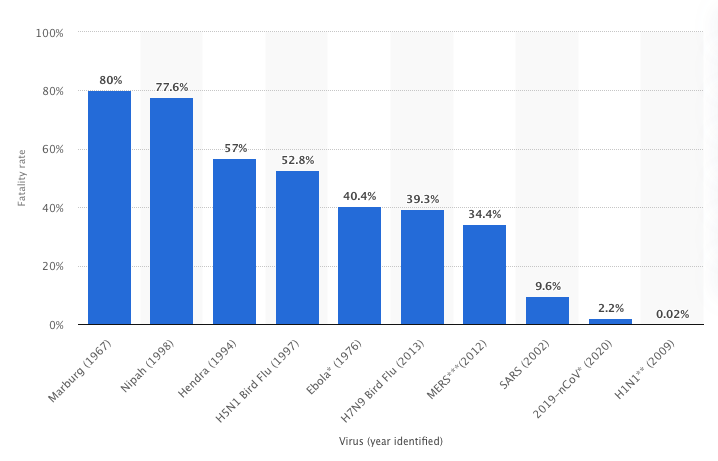
Imagine if the fatality rate was similar to what we’ve seen in other viruses — it’s not unreasonable to picture 50-100 million people dead.
Don’t forget the ripple effects. If you think the second- and third-order effects were bad from Covid, then a pandemic that actually left piles of bodies in the streets would make 2020 look like a holiday. One of the best survival movies is Contagion, which does a decent job of showing what a more serious (but still on the low end of serious) pandemic would look like.
The big lessons we hope society learns
The obvious lesson is around pandemic preparedness, but it spiritually applies to any big black swan event. Governments and businesses need to do a drastically better job at preparing for these kinds of emergencies so they can prevent, recognize, and react in effective ways.
I worked as an advisor on these issues to a previous White House and co-founded the Defense Innovation Unit for the Department of Defense — so I can tell you first-hand that there’s a lot of known low-hanging-fruit ways the government can be better at this stuff, provided the desire is there among leaders and the public.
Other lessons Covid has shone a light on:
- Teachers and other essential workers aren’t treated nearly as well as they should be.
- Hospitals must have more than a few days worth of PPE and other critical equipment on hand at any given time.
- The need for more local food and supply chains.
- How selfishness, ignorance, and anti-science garbage can derail things for everybody.
- The digital divide hurts disadvantaged kids who can’t access online learning, or just rural folks in general who don’t have the internet they need (hurry up Starlink!)
- Way too many people live hand to mouth. Something’s wrong when people can’t afford to bury their COVID-stricken parent or survive a few weeks without work in the “richest country in history.”
- The richest 1% adding a trillion dollars in personal wealth over 2020 while the majority of people suffer means our economy is not working as it should.
- How stretched thin we get just from one emergency, so when you pile on another (eg. insurrections or a sideways ship blocking a trade route canal), things get exponentially worse. It’s sometimes called an emergency jackpot, like hitting all 7’s on a slot machine.
A positive example happening right now is the realization among western governments that depending on China for high-tech manufacturing is a recipe for disaster.
Again, experts have been talking about that precise problem for years — I even gave a speech about this exact topic in China back in 2014 — but now that Covid has really smacked the politicians in the mouth in this regard, they’re doing something about it.
It took that kick in the nuts to get things done. Automakers closing plants and PlayStation 5s being hard to find due to microchip shortages are relatively mild prices to pay. Imagine if we hadn’t learned this lesson until World War III broke out and we’re suddenly at war with the people making our critical tech?
So even just in this regard, Covid has had positives.
Changes you can make without depending on broken government
History tells us that this list of big lessons likely won’t be learned. But maybe some easier or more personal ones have a better shot?
Some of what I’d love to see permanently change after Covid:
- When people feel sick, they think of the greater good and wear a mask or stay home
- Less social acceptance for people not washing their hands after using the bathroom
- People stop shaking hands as a greeting
- Public doors have hardware attached so you can open/close them with your foot
Obviously you should do these things yourself. But you can and should influence others, too. We obviously don’t want to be annoying tattletales, but these kinds of changes require good people speaking up — otherwise it will just default back to the old bad behaviors.
There’s already some precedent for #1. After SARS Part One back in the early 2000s, the culture in Asia changed to become more community-health conscious, mask wearing was destigmatized, and so on.
Some examples of how you can indirectly help these changes:
- If you work in food service or retail and catch an employee not washing their hands, do the right thing and fire them.
- Notice a restaurant employee (eg. a Subway sandwich maker) not following hygiene protocols? Speak up, walk out, and leave a review.
- If your job gives you the ability to install more hands-free hardware on things like doors, then do it! No budget? Ask for it!
- If you’re in a business and notice these kinds of positive changes, tell the owner you appreciate it. Businesses subsidize what customers want, but only if they know you care about it.
- Encourage your workplace to proactively support people staying home when they feel sick. Fear of punishment is why people go to work while sick.
- Don’t make fun of people who wear a mask when they have seemingly-mild symptoms. They’re doing it to help you, not themselves.
- You wouldn’t tolerate someone at Walmart walking up to you and punching you, so why would you tolerate them making you sick (or even killing you) by way of them selfishly choosing not to wear a mask during a pandemic? Speak up and defend yourself.
Another thing you can do is recruit more preppers and advocate for sane preparedness in your community. The last year has convinced a ton of people that part of being a responsible adult is preparing for stuff like this. All they need is a friendly hand to guide them!
For example, the “flatten the curve” language helped a lot of normies understand the idea that The System is easily overloaded in an emergency — so part of being a good community member is to keep yourself out of that mess. That same concept applies to food chains, the power grid, EMS, and so on. Use the Covid experience to help people understand other types of scenarios.
What do you hope changes?
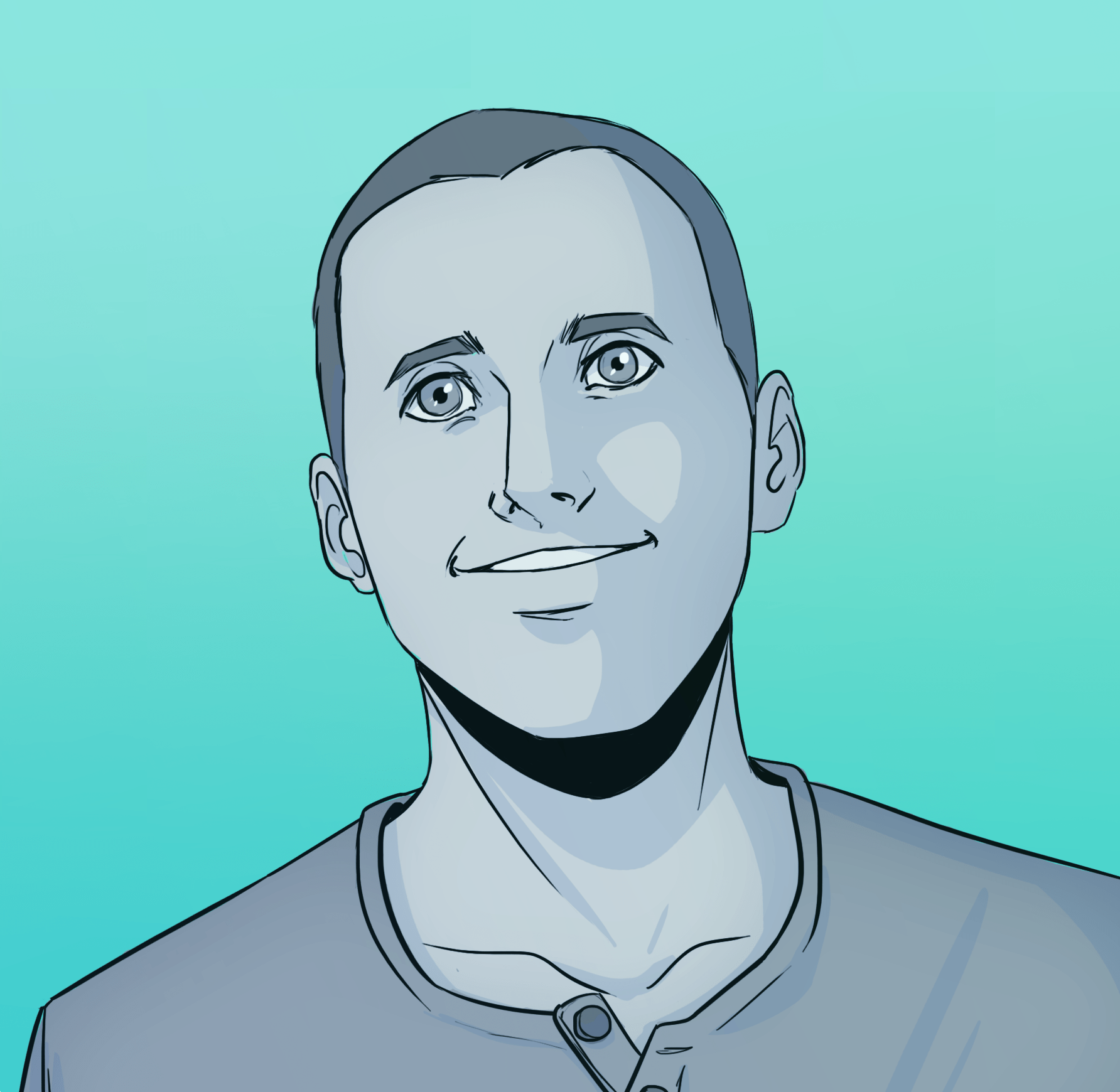
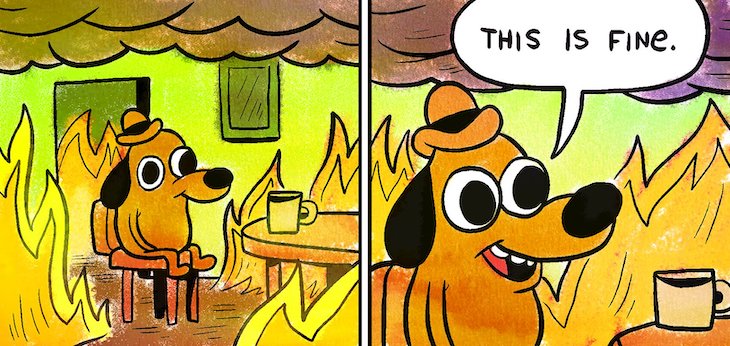
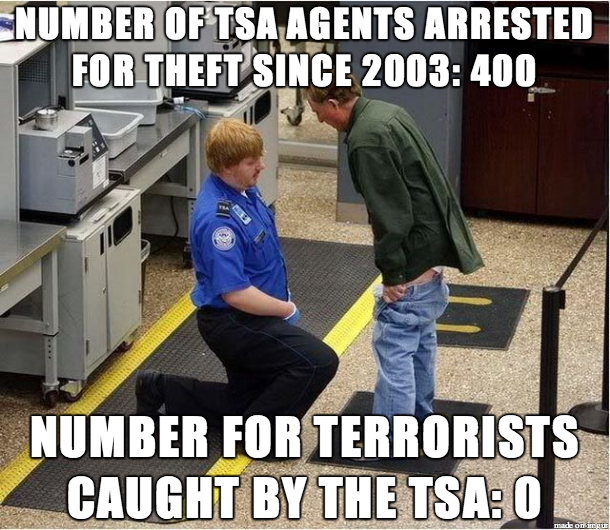
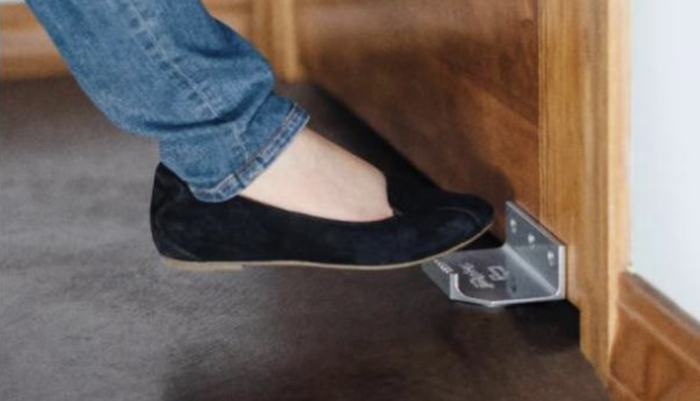
You are reporting the comment """ by on